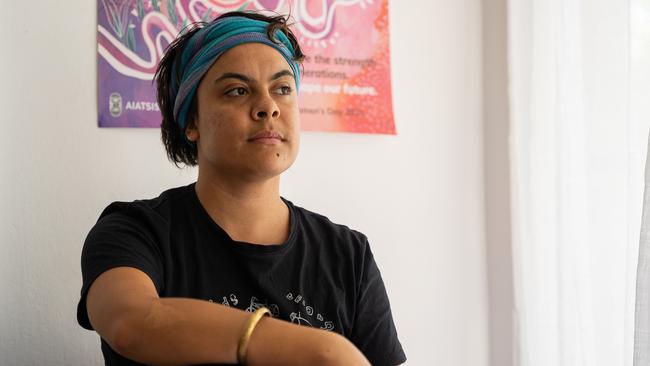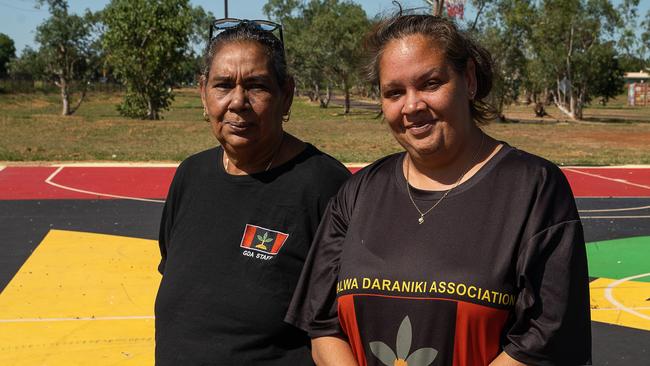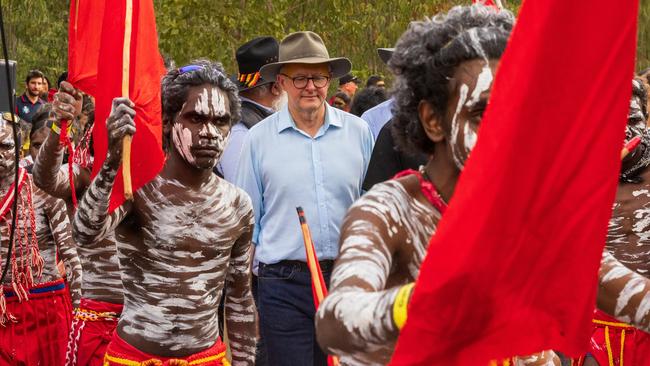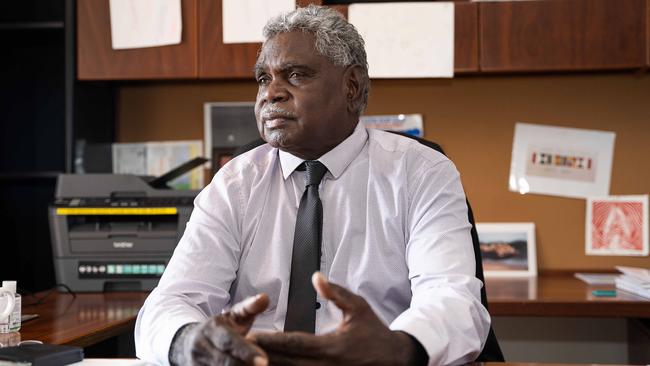Kulumbirigin Danggalaba Tiwi woman Mililma May knows what it means to have the courage of one’s convictions.
The chief executive of not-for-profit activist organisation Uprising of the People spent much of 2021 with criminal charges hanging over her head following a peaceful protest against the Territory government’s tough-on-crime bail reforms.
Those charges were ultimately dropped and these days Ms May spends her time co-ordinating the grassroots organisation “that empowers the community and stands up against injustices” from a modest office space within shouting distance of Chief Minster Natasha Fyles’ own Nightcliff electorate office.
So she probably spends more time thinking about the big issues than your average 24-year-old.
And in 2023, no issue is bigger for many Aboriginal Territorians than the federal government’s upcoming referendum on enshrining an Indigenous Voice to Parliament in Australia’s Constitution.
After much thought, and not without reservation, Ms May says she’ll be voting yes “as a small step to a much bigger journey ahead for getting justice for our people”.
“I see the Voice as a clever use of the colonial law, the white man’s law,” she says
“I see it as very clever to go to the Constitution to make a change in an attempt to prevent political parties coming in and changing laws as they alternate in power.
“So I think changing the Constitution has demonstrated that blackfellas really brilliantly understand the law and want to try and use the law in a way that could benefit us.”
But Ms May’s support for change is not unqualified and comes tinged with disappointment the government’s proposal will leave the finer details up to it.
“The current proposal is saying that the government decides what it’s going to look like, what the ins and outs are going to be,” she says.
“Yes, that’s done in consultation with different people but I’m just wary that if it ends up being that the grassroots activism from 2017 that created the Voice then gets actually just put in the hands of the government of the day to decide what that looks like, that is disappointing.”

Meanwhile, at her home in the Kulaluk Aboriginal Community on the Darwin shoreline along Dick Ward Drive, Helen Secretary is only a stone’s throw from Ms May’s northern suburbs office.
But when it comes to the Voice to Parliament, the two are poles apart.
Ms Secretary says she, along with most of the 150 or so residents of Kulaluk and Minmarama next door, will be voting no.
As chairwoman of the Gwalwa Daraniki Association that administers the two communities, and granddaughter of revered Larrakia statesman Bobby Secretary, she has spent decades fighting for bottom up reforms for the benefit of her community.
Equally, Secretary has seen endless streams of cash funnelled through various government organisations over the years that have failed to achieve lasting change for the better — and she believes the Voice will be “divisive”.
“We are all Australians, we’re a multicultural country, but there’s a difference when you’re talking about Indigenous Traditional Owners,” she says.
“We are Indigenous but we have our own boundaries, our own lands, and with our lands comes sacred sites, gathering places, different languages, we all don’t speak for (each other’s) country when it’s concerning our ancestry or lands.”
Ms Secretary also worries a Voice from Canberra could run roughshod over the wishes of the Larrakia people and other local tribes who like her, have been working towards their own self-determination for generations.
“We have our own constitution that outlines our decision making on what happens on our land, we’re our own voice,” she says.
“I live and run Gwalwa Daraniki Association, which in Larrakia means ‘Our land’, and this has been my home since I was six and my extended family.
“We are trying to take self-responsibility and self-determination on achieving our goals, creating economic development for the future of our members and our organisation, because we have connections to the land as Larrakia descendants.
“You cannot speak for other lands, other tribal lands.”
Instead, Ms Secretary wants to see treaties signed with individual sovereign First Nations so they are empowered to run their own affairs.
“Give us treaties, then we’re our own voice, we decide on what happens, not someone that doesn’t live in the Territory, live in our communities, have no idea on what our dreams are, to be self-sufficient, to benefit our people, creating economic development on our lands — not people that have no idea,” she says.

Back in Nightcliff, Ms May says while “it’s valid that people don’t trust the government and have lived experience of why they don’t trust the government”, she doesn’t share Ms Secretary’s view that treaties must take priority.
Ms May says “I want the tribes and clans to be empowered” but believes empowerment can coexist with a constitutionally enshrined Voice to Parliament, through organisational structures not unlike the GDA.
“I want Aboriginal people to come together with their clans and their tribes and say ‘Hey, we need to make sure that we’re a structured voice’, we have to create the alternatives ourselves, to the big peak bodies, (because) if we don’t create the alternatives to the peak bodies, they’re not going to exist, so then it will be the big peak bodies that are the voice,” she says.
“So the solution (is) we make our own organisations, and it can be as simple as getting an ABN and starting your own company with just your family as the directors.
“That way you opt in and opt out of decisions that effect your land and your country, it doesn’t mean that then you have to say ‘yes’ or ‘no’ to everything and anything.
“You don’t even have to comment on everything, but if there’s a particular issue that effects your community, you’ve already got a structured voice within the white man’s law.”
As an MLA in the Territory Parliament, now heading into a sixth year representing his Yolngu mob, Yingiya (Mark) Guyula has a better understanding of the inner workings of politics than most.
And that includes many of his constituents in the remote Arnhem Land electorate of Mulka where traditional Yolngu law and culture often take precedence over Western formalities.
So while he says he’ll be voting yes, he worries that if a referendum is held this year, as foreshadowed by Prime Minister Anthony Albanese, it could fail through a lack of clarity among remote Australians.
“There’s a call, or a voice, being echoed around the country but not everybody knows what it is,” he says.
“It’s all happening in the chambers, in the federal government, in the Northern Territory government but it hasn’t been properly consulted with the people.
“It is supposed to be a voice that will echo out and call to people how to vote towards treaty and truth-telling but it needs to start off with proper consultation.
“Grassroots people are the people that need to know what Voice is and what all this is about.”
Mr Guyula is now calling on Mr Albanese and Indigenous Australians Minister Linda Burney to travel to his ancestral homeland to “go out and sit down with the people and get the real story and understanding”.
“Somebody needs to go out there and explain to people,” he says.

“People are just wondering, I believe, especially in my electorate, the people out there, they would be relying on me to collect the stories from the government and tell the people out there but I would urge the government to come out and do consultations, proper consultations.
“I need the government, the Prime Minister, because he’s calling for the Voice to happen first, he needs to come out and sit with the people, come and consult with the community around Australia.
“If we’re going to have a referendum (by the) end of this year then the government needs to start moving right now, they need to go out and do it right now, sit down with the grassroots people, the communities.”
And while he wants to see the referendum succeed, Mr Guyula says he and those he represents “would rather see Voice, treaty and truth-telling all happening together”.
“They rolled (out) the Intervention in the blink of an eye, they can bring the Voice, treaty and truth-telling in the blink of an eye today, they can do it today,” he says.
“This Voice should be a representative, or what we call the ‘djawarrkmirr’, it’s a proclamation that calls out ‘this is what the people are ready for, this is what the people want to see’.
“We’re sick and tired of waiting and listening to what the government has been doing and telling us what they think is best for our people.
“It’s time for Yolngu people to make a proper decision and through the Voice, we need people from the grassroots to be on that panel.”
In response, Ms Burney pledged to visit communities in the Northern Territory “on a number of occasions over the coming months”.
“The Northern Land Council has been doing some great engagement work across Arnhem Land on the Voice referendum,” she said.
“I am looking forward to visiting the Northern Territory on a number of occasions over the coming months, including for the Joint Council on Closing the Gap in Darwin and the Barunga Festival in June.
“A civics information on the Voice referendum will kick off across the country next week. “This will help give Australians the information they need ahead of the referendum later this year.”


Add your comment to this story
To join the conversation, please log in. Don't have an account? Register
Join the conversation, you are commenting as Logout
‘I have fallen in love with the NT’: Story of a Ugandan-born lawyer
This Ugandan-born lawyer has overcome a lifetime of obstacles to finally get admitted to law in the Northern Territory. Read his story.
‘Treated like animals’: Death in custody warning over watch house
Women are allegedly being crowded into cells in view of masturbating men at the Territory’s police watch house. WARNING: Distressing images.